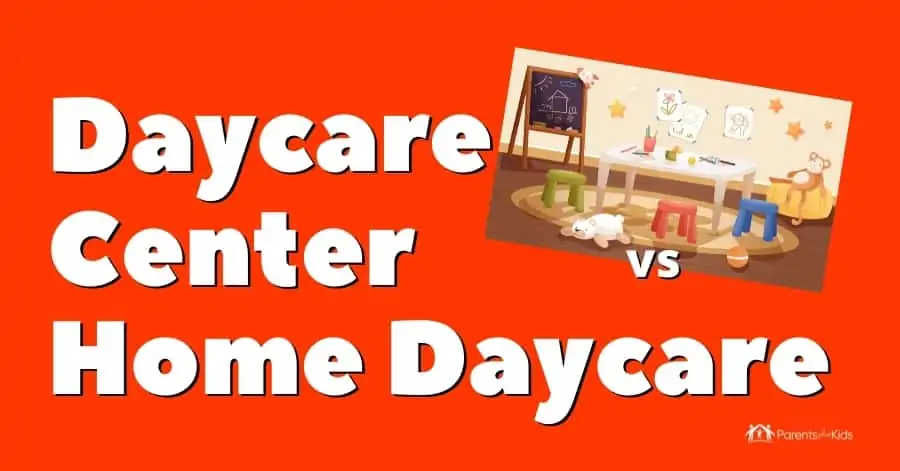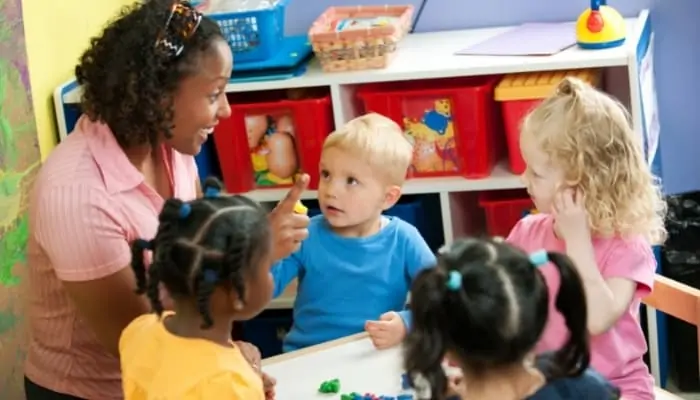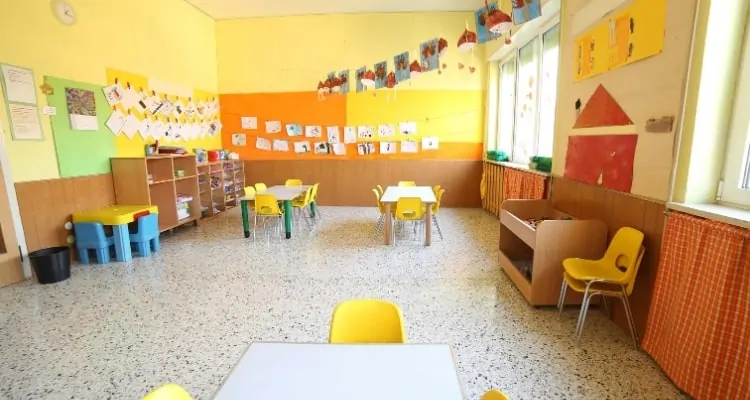In-Home Daycare vs. Daycare Center: Which One is Better?

This post may contain affiliate links. If you buy through the link, I may earn a commission. Learn More.
In a perfect world, parents could stay home with their children and still pay the bills. Unfortunately, this isn’t the case, leaving parents looking for good, affordable childcare.
Many parents find themselves considering either in-home and formal daycare. How do you know which one to choose?
*FYI, some of the links in this article about at-home daycare vs daycare centers may be affiliate links. If you click and make a purchase, we may get a commission (at no extra cost to you). For more info, please see our disclaimer.
In-Home Daycare VS Formal Daycare Centers

As a parent of four, I know the anxiety-inducing experience of dropping your kids off with someone. No matter how calm I try to be, I just can’t breathe right until they’re back with me.
As parents, it’s our job to protect our little ones and provide them with the best we can. So choosing where to send them while we work or take care of other things is definitely not something to be taken lightly.
Before we dive into comparing these two options, it’s important to note a few things. First and foremost, not every home daycare or formal daycare is going to be just alike. In a moment, we’re going to go over the most common characteristics, but that doesn’t mean they’re all the same.
This brings us to the next point. Whether you choose an in-home or a formal daycare, you need to check references and reviews. This is one of the only ways you’ll find out some things you need to know.
And lastly, be sure you pay attention to your child. If they seem unhappy or to be changing negatively once they begin attending daycare, you’ll need to find out why. It might be nothing, but you won’t know until you investigate.
Now that we’ve got that out of the way, let’s take a look at some of the most commonly known similarities and differences in this table. Then, we’ll dive into a better explanation of them.
| In-Home Daycare | Formal Daycare Facilities | |
|---|---|---|
Environment | Comfortable and “homey.” | More sterile and structured, like a school. |
Education | Typically provides early education and smaller class sizes. | Often provides more structured early education but larger classes. |
| Exposure to People | Kids of all ages in the same room. | Broken into age groups. |
| Hours of Operation | More flexible hours, sometimes even overnight care. | Typically works within regular business hours. |
| Continuity of Care | Same teacher every year. | Teachers change according to age group. May have high turnover among employees depending on daycare. |
| Activities | Often less structured May allow more TV time. Make sure to ask about daily activities. | Structured activities Outdoor play area Little to no TV or video games |
Environment

One of the biggest benefits of an in-home daycare is the environment. It provides a comfortable, home-like atmosphere that can put a child at ease.
A formal daycare center is typically more like a school, which typically gives off a sterile vibe. It may cause your child to feel uncomfortable, especially in the beginning.
While the choice is yours, it can be beneficial to keep your little ones in a home environment for the first few years. As they get closer to kindergarten, you might consider moving them to a formal daycare to help them ease into the actual school environment.
Education
Both in-home and daycare centers usually provide some sort of educational curriculum. The type of curriculum varies, so it’s important that you ask any daycare you’re considering what type they use.
Usually, though, an in-home daycare has smaller class sizes of up to six per teacher. Daycare centers often have up to 12 per teacher. This means that an in-home daycare can typically provide more one-on-one instruction for your child than a daycare center can.
Pro-Tip
This can vary, so make sure you pay attention to what the ratio is when you’re taking a tour of either option. Make sure you don’t pick an option that’s running unsafe ratios regularly.
Exposure to People
In-home daycare facilities often have children of multiple age ranges in the same class. This gives each child the option to socialize with a wider variety of ages. Daycare centers are more like traditional schools as they usually break children up by age.
There is another thing to point out here. Your child is more likely to be exposed to other types of people at an in-home daycare. This can be both a positive and a negative thing.
For example, the in-home daycare teacher may have to get a plumber to come in and work on a clogged drain. This can be a good life lesson or teaching moment for your child that they probably will not get at a formal center.
On the other hand, the in-home teacher may also allow other people into the home while children are around, such as boyfriends, shady family members, and so on.
This is not necessarily a bad thing, but not knowing who your children are around can be frightening and risky. Formal daycare centers are typically very on-guard about who gets around the kids.
Related: How to Find a Daycare
Hours of Operation
This is another one of those areas that really depends on the exact daycare you’re considering. However, most of the time, in-home daycare options offer more flexible hours. Daycare centers usually close up soon after regular work hours end.
This is important when you work irregular shifts. When my oldest son was two, I worked at a local restaurant that did not even close until 11 pm. That meant I was not leaving until at least midnight.
All the formal daycare centers in my area closed at 5:30 pm. Had I not found an in-home daycare, I would not have been able to work at all. If you get off after 5:00 pm, an in-home daycare is probably your best bet.
Continuity of Care
Like school, a daycare facility usually moves children to different teachers according to their age. That means they’ll likely have a new teacher each year.
Additionally, turnover can be high in formal daycare facilities. With in-home daycare, they receive their care and education from the same people each year, which can be beneficial in many ways.
Activities

Formal daycare centers usually provide a fairly structured curriculum with several activities to stimulate the kids. Additionally, there is an outdoor play area where the children go out and get daily exercise.
In-home daycare can provide the same exact thing, but they don’t always do so. In fact, your child may spend more time watching TV or playing video games than doing anything educational.
When making your decision, it’s important to ask what exactly your child will be doing all day. If you think there is too much TV or not enough exercise, you’ll need to move onto another option.
Remember, it’s okay for your little ones to have TV and game time, but there are boundaries. You’ll have to determine which of your daycare options sets and keep boundaries you agree with.
Once again, daycare options vary. Not everything listed here will apply to each daycare. However, it does give you a starting place. You can take these characteristics to determine which one sounds more comfortable. Then, you can interview several providers, asking questions about each of the features listed here.
Looking for a Good Quality Daycare?
Find an affordable and qualified daycare center that fits your needs.
Both Can Be Really Good Options Depending
So, should you choose an in-home daycare or a formal daycare center? It really all comes down to your needs and what makes you feel most comfortable, but let’s try to sum it up a little.
An in-home daycare is usually a better choice if you want your child to feel more “at home,” want a more relaxed learning environment, and want the same teacher interacting with your little one. In-home is also better for parents that do not work standard business hours.
A formal daycare center is better if you’re looking for more structure and working a regular daytime shift. It’s also a good choice if you’re getting your child ready to start kindergarten.
No matter which way you’re leaning, be sure you check out any local options in-depth. Ask for recommendations from friends and colleagues. And, if you want to do in-home daycare, ask for personal references.
